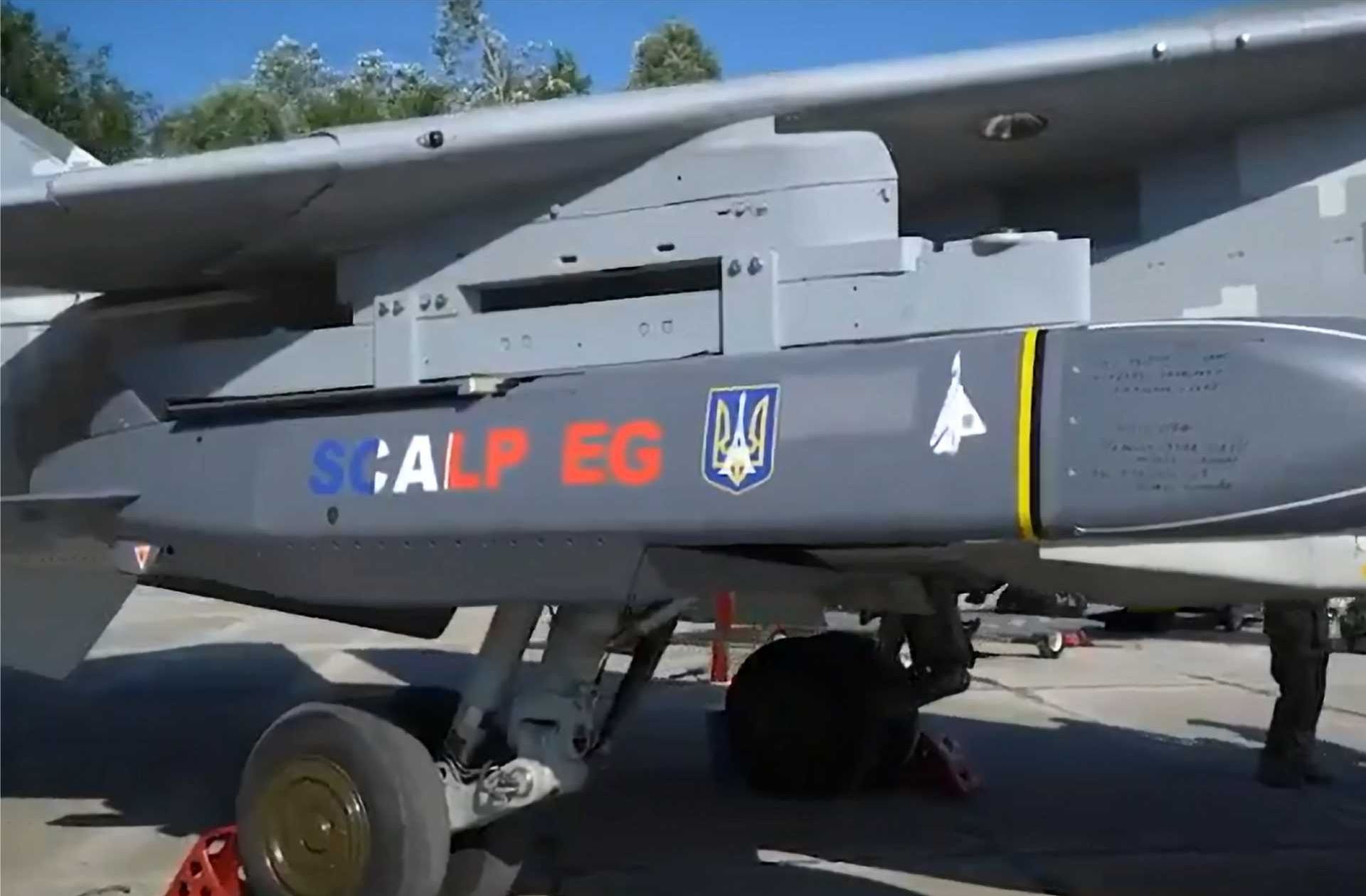Breaking News
France Confirms Full Commitment to Support Ukraine Including Use of SCALP Missiles Against Russia.
During an interview with the BBC, the United Kingdom's national broadcaster and one of the world’s most respected news organizations, on November 23, 2024, French Foreign Minister Jean-Noël Barrot affirmed that France recognizes no "red lines" when it comes to supporting Ukraine in its defense against Russian aggression. Barrot stressed that Ukraine is within its rights to use French-supplied SCALP long-range missiles to strike targets inside Russia as part of its self-defense. However, he refrained from confirming whether these French weapons had already been utilized in such operations.
Follow Army Recognition on Google News at this link

A French SCALP long-range cruise missile mounted on a Ukrainian Su-24 strike aircraft symbolizes France's commitment to bolstering Ukraine's defense capabilities in its conflict against Russian aggression.(Picture source: Ukraine MoD)
The SCALP missile, known internationally as the Storm Shadow, is a highly advanced, long-range cruise missile developed by France and the United Kingdom. It has a range of over 250 kilometers and is equipped with precision-guided technology, allowing it to strike high-value targets with minimal collateral damage. Designed to evade enemy air defense systems, the SCALP missile is an invaluable asset for operations against heavily fortified or remote locations. It is fired from aircraft, and its stealth capabilities enable it to penetrate deep into enemy territory, making it a critical component of Ukraine's ability to disrupt Russian logistics and command centers.
Since the beginning of the war in February 2022, Ukraine has received unprecedented military support from Western allies. This assistance has evolved from initial deliveries of small arms, ammunition, and humanitarian aid to the provision of advanced weaponry and training. Key contributions have included U.S.-supplied HIMARS rocket systems, Patriot air-defense batteries, and artillery systems such as the French Caesar howitzers. Tanks, including the German Leopard 2 and British Challenger 2, have bolstered Ukraine's ground forces, while modern drones and counter-drone systems have enhanced its aerial capabilities. Additionally, NATO countries have provided training, logistical support, and intelligence-sharing to strengthen Ukraine’s resistance and its ability to conduct complex operations.
Barrot’s comments come in the wake of the first confirmed strikes using U.S. and U.K. SCALP/Storm Shadow missiles on Russian soil, highlighting a turning point in the conflict. His remarks follow similar indications from French President Emmanuel Macron earlier this year, who suggested that French missiles could be used against Russian targets under the logic of self-defense. Barrot’s unequivocal stance now solidifies France’s position, reinforcing the message that arbitrary limitations will not constrain Western support for Ukraine.
During his visit to London, where he held talks with British Foreign Secretary David Lammy, Barrot emphasized the importance of sustained and unrestricted aid for Ukraine. “Western allies should not set and express red lines,” he declared, underlining the need for unity and determination among NATO members. This rhetoric aligns with France’s broader strategy of ensuring Ukraine has the resources necessary to counter Russian advances, while simultaneously preparing for a potentially prolonged conflict.
The dramatic escalation of events on the ground underscores the significance of Barrot’s statement. Recent reports indicate that U.S. and U.K. SCALP/Storm Shadow missiles were used for the first time to target Russian military sites. Meanwhile, Russia has reportedly deployed a new type of missile, and President Vladimir Putin has warned of the risk of global conflict. These developments underscore the high stakes of maintaining robust Western support for Ukraine.
France’s contributions are part of a broader NATO effort to sustain Ukraine’s resistance. Western nations are increasingly focused on long-term financial and military aid packages, with one source highlighting the need for a comprehensive “war chest” to support Ukraine through 2025 and beyond. European countries are also considering intensified measures, such as seizing Russian assets to fund Ukraine’s defense.
Additionally, intelligence suggests that Ukraine has been conducting effective drone operations, targeting Russian ammunition depots far behind enemy lines. In mid-September, drones reportedly destroyed four depots stocked with Russian and North Korean-supplied munitions, representing one of the most significant blows to Russia’s logistical network during the war. While it remains unclear whether these drones were provided by the U.K., France, or other allies, the strikes illustrate the growing sophistication of Ukraine’s capabilities, supported by Western technology and expertise.
France’s unwavering support since the onset of the war has been instrumental in Ukraine’s ability to withstand Russian aggression. By removing so-called "red lines" and providing advanced weaponry like the SCALP missile, France demonstrates its commitment to ensuring Ukraine’s sovereignty and territorial integrity. This approach, echoed by other Western nations, sends a clear message that the alliance is resolute in its determination to counter Russian aggression and support Ukraine for as long as it takes.


























